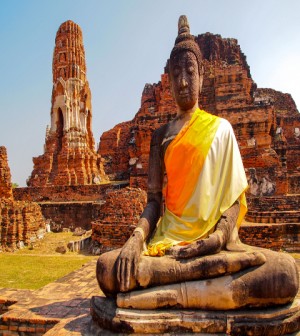- 5 Tips To Finding Peace Within Yourself
- The Do’s and Don’ts of Learning How to Accept Yourself
- How to Find Your Inner Peace and Transform Your Life
- 8 Benefits of Having an Open Mind and How to Get One
- Learn How To Be A Happier Person
- What Is The Meaning Of Life?
- Laws of Abundance – The Riches of Love and Joy
- How to Be Laid Back By Following These 9 Simple Strategies
- The meaning of confucius’ golden rule – 4 practical ways of living it
- 3 methods of unleashing the power of contentment in your life
How Buddhism and Karma are Linked: Eight Questions Answered

Karma is generally associated with Buddhism. Eight commonly asked questions are explained to show the connection between Buddhism and karma.
1. Where Does Karma Come From?
The concept of karma has been around for a long time. It was a central belief in India before Buddha, however, Buddha explained the ideas and principles in such great detail that it became widely associated with Buddhism. It plays a central role in Buddhist beliefs.
2. Is Karma the Same as Fate?
Karma is often wrongly believed to be the same as fate or destiny. It is neither. In actual fact, karma means simply action. Physical actions, verbal actions and thoughts all constitute karma, so long as they are intentional. Unintentional acts are not karmic.
3. Why is Karma believed to be Fate?
There are two forces at work, karma and vipaka. They create a cause and effect situation, with karma being the action that creates cause and vipaka being the result arising from the cause. Like attracts like, so if somebody creates bad karma, they will receive bad things in return. On the other hand, those who perform wholesome and good deeds will have good returned to them. It is therefore crucial that people create good karma, as the effects can be difficult to undo; it is far easier to perform good actions in the first place.
4. Are People Born With a Karmic Influence?
The Buddhist belief system includes the idea of reincarnation. To a certain extent, people are born with some karmic influences that have carried over from a past life. Reproductive karma takes into account actions from the past life and affects the person in the new birth. It is the karma that existed at the moment of death in the preceding life. Whether this karma is positive or negative, it is further enhanced by what is known as the supportive karma. This is completely neutral, and acts only to support the reproductive karma.
5. Is There Any Counteractive Force to the Birth Karma?
There is a type of karma, known as the counteractive karma, that provides a totally opposite effect to the reproductive karma. Therefore, if a person is born with good karma they will have some negative experiences throughout life because of the counteractive karma. Likewise, someone who is born with bad karma can still experience positive things.
6. Can I Change my Overall Karma?
Destructive karma can operate in a beneficial or harmful manner and can completely cancel out all other types of karma. It takes into account past actions throughout different lives and can be drawn from several different lifetimes.
The deeds done in the current life can also affect the balance of karma, meaning that karmic levels can be in constant flux.
Meditation is often used to attract good karma and undo any previously accrued negative karma. It increases awareness and mindfulness, which encourages positive and right actions.
7. Who or What Decides on the Weighting of Karma?
There is no supreme being that sits in judgement over people, attributing blame or reward. Rather, Buddhists believe that it is a natural process, a result brought about by actions. A person really is therefore in charge of their own fate, both in this lifetime and in the next. It is for this reason that Buddhists typically accept unfavorable events with a sense of fortitude, endurance and patience, rather than anger or despair, believing that they are naturally occurring results of a past action, and that a future point in time should bring better times.
8. Is Karma the Main Buddhist Principle?
Whilst it is an important Buddhist principle, there are many other Buddhist beliefs to be followed and learned along with the idea of karma. Buddhist philosophies have 24 conditions. Along with karma, one must also be aware of the Eightfold Path, the Four Noble Truths and reincarnation. Karma does not, therefore, operate in isolation.












































You must be logged in to post a comment Login